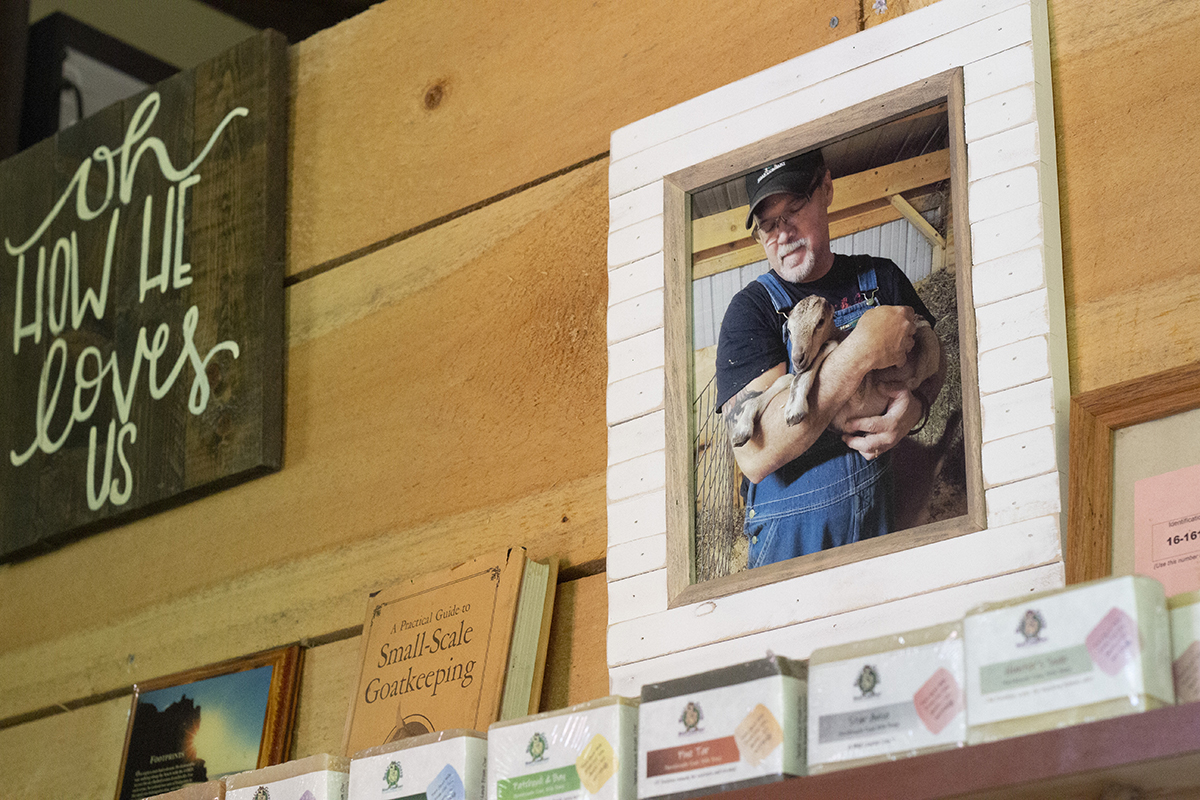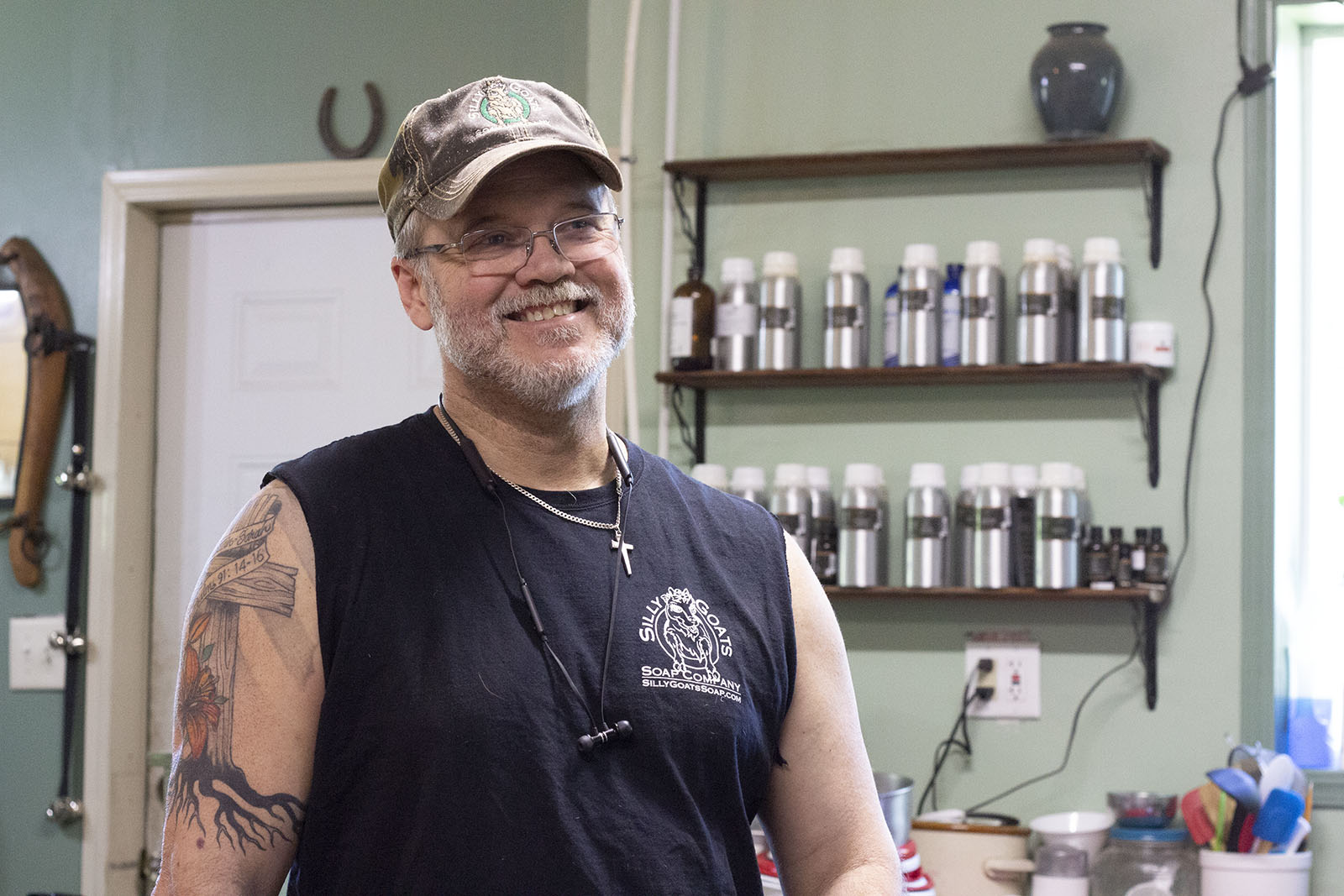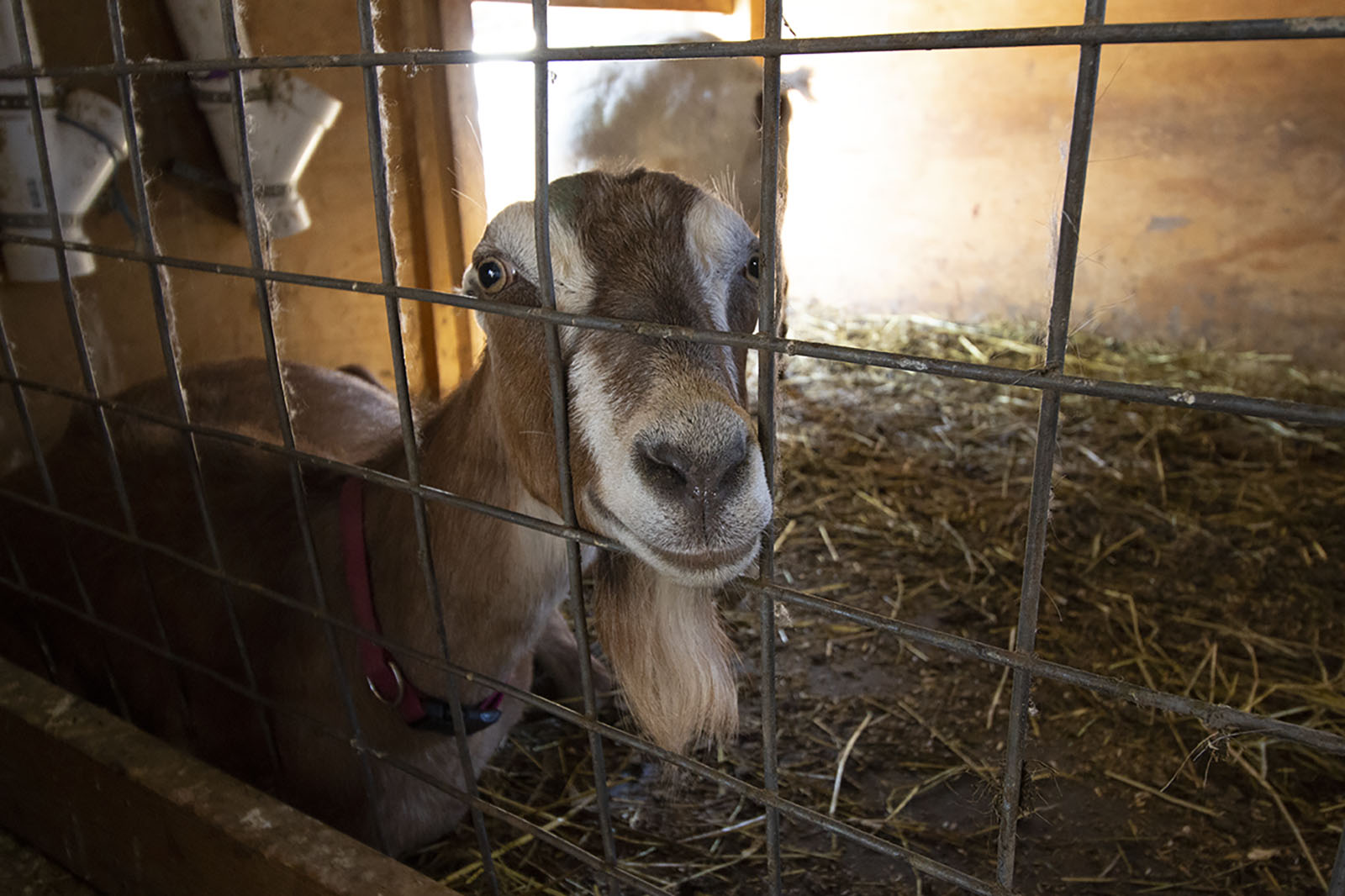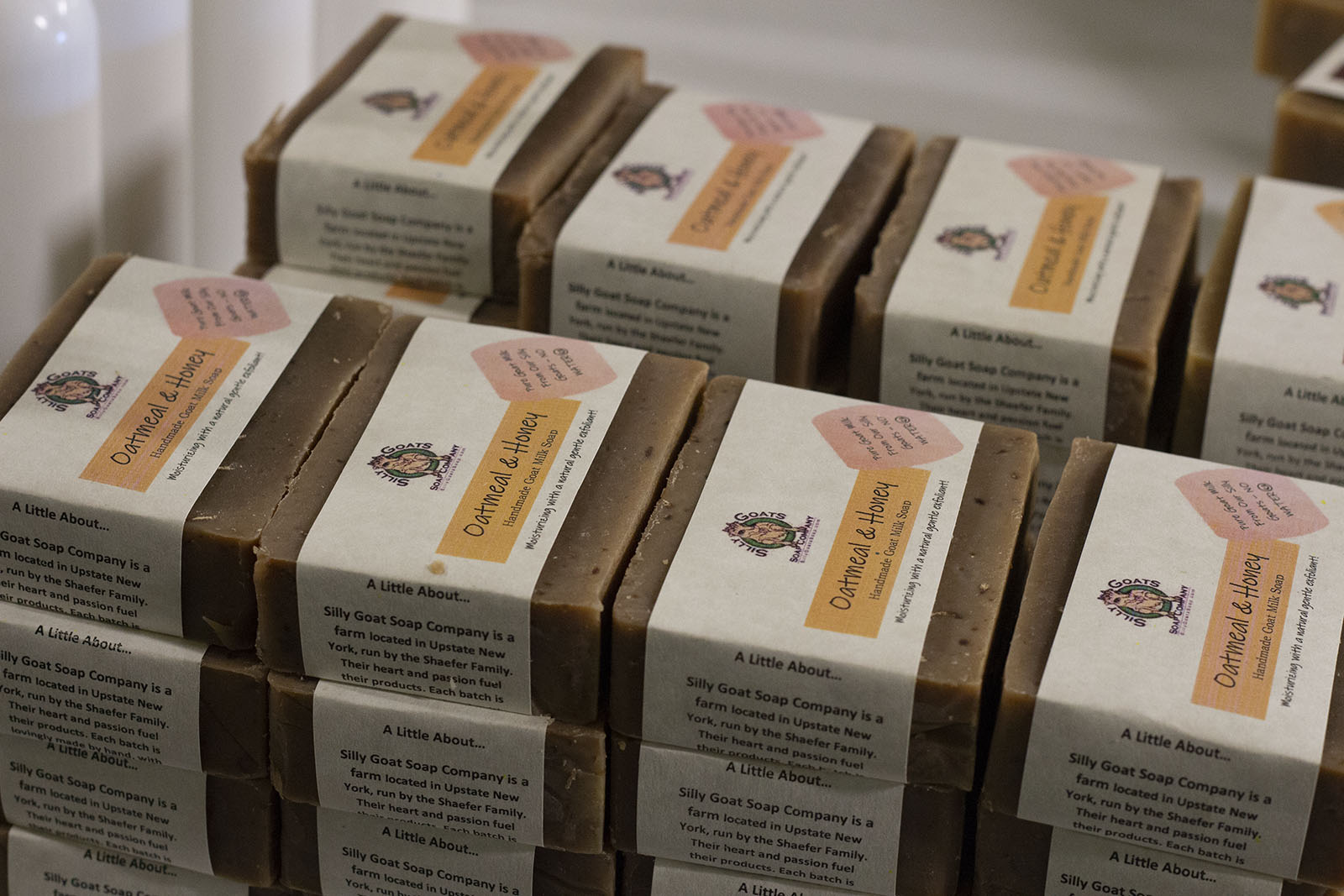Founder and owner of Silly Goats Soap Company Chris Shaefer, 56, stood in a small pen, hay crunching under his boots while he showered Blossom, a pregnant white goat and his self-confessed favorite, with head pats and face rubs. Chris wore a black, sleeveless tee and camo ball cap, which both featured his company’s logo, along with glasses, a beard, and a tattoo of a cross that stretched from his shoulder to his elbow. “Are you done? Are you done yet?” Chris asked Blossom in sotto voce as her eyelids squinted around her horizontal pupils in bliss as her head grind against his legs. Just a few feet away, another brown doe named Daisy Mae sat on guard as if assigned to watch over her pregnant friend Blossom, one of three pregnant does expected to grow the herd when they give birth later in the summer.
The high pitched bleats of baby goats echoed across the open farm just outside the barn door. The other goats grazed in a pasture set behind the house — except for the lone male, Chunky. He grazed in a fenced, smaller pasture of his own on the other side of the farm, enjoying the shade of trees along his enclosure’s fencing. The family home sat just a few meters away from the red-paneled barn and attached store. The Shaefers, along with some of their church friends, built the store in 2017 after it outgrew its location inside the house.
The farm boasts 15 or 16 American-bred Lamancha goats. Chris admits it’s not unusual to lose track of the exact number during the birthing season. And thanks to a new and lucrative deal with Whole Foods and Amazon, his Silly Goats Soap Company farm is preparing diligently for the new additions. Eventually, he’ll need their milk. After more than a year of planning and negotiation, the farm partnered with Laura Cameron, CEO of the artisanal brand Made with a Mission, to place his goat-milk lotion into more than 500 Whole Foods stores across the nation with an expected launch date in August. The Shaefer’s farm will make and supply the goat lotion, and Cameron’s company will brand the bottles. It’s expected to be priced at $10.50 for an 8.5-ounce bottle, putting it in the lower-range price for similar products. Amazon, which bought the premium supermarket chain in 2017 for nearly $14 billion, will also make the lotion available for Amazon Prime subscribers.
“Christmas and Thanksgiving are going to be huge for us,” Chris says. The Shaefers expect a crew from Whole Foods to come to the farm in preparation for the product’s fall advertising blitz. The lotion is slated to be featured in Whole Foods’ upcoming newsletter in October and December.

It took the Shaefers, who recently moved to a new farm in Columbia, Ky., only five years to go from a desire for fresh milk to a coveted spot on a Whole Foods shelf. They started goat farming in 2014 prompted by a desire for fresh milk with their morning coffee and in support of the larger goal of becoming more self-sufficient on their 13.5-acre farm in Canastota, N.Y. They also wanted to do something with the excess milk, deciding the surplus could be best used for skin care after some research into its purported dermatological benefits. Chris has battled psoriasis for more than two decades, and his wife Sandy avoids commercial soaps because the chemicals irritate her skin. So they created a range of products from goat milk soap to lotion, beard oils, balms, muscle rubs, bath bombs, natural bug spray, a full line of baby products, and a brand new line of hemp products with cannabis grown elsewhere in the state.
They sell their “goat goodies” in a small shop adjoined to the two-goat milking station and barn. It’s a deceptively small setup for the volume Chris expects to put out once the product hopefully catches on with the public. They also maintain a web store where customers can purchase all of the farm’s product offerings, including the same goat milk lotion soon to hit Whole Foods’ shelves. The only difference is the label: the Shaefer’s bottle bears the Silly Goats Soap Company logo.

With the first Whole Foods check in hand, Chris started transforming the farm to scale for the demands of the high-end American grocery chain, collecting and freezing milk for the first order of 8,500 pounds of lotion. He projects ongoing monthly orders of 7,500 to 10,000 pounds. “We’ve always been in the black,” he says, “but this will put us in the black black.” Each week, 55-gallon industrial drums of sunflower, olive, avocado, and almond oils along with shea butter are scheduled for delivery for Chris and Sandy to turn into sellable products.
The Shaefer’s partner, 34-year-old entrepreneur Laura Cameron, started her artisanal brand Made With A Mission in 2013 as a social enterprise with the goal of giving money back to the local rescue mission in Colorado Springs, where she remains a resident. Now, her company acts as a conduit for smaller craft operations to go mainstream. Beginning as a candle making company, Made With A Mission used recycled glass bottles and labor from graduates of the rescue mission to create candles “that told a story.” The partnership with the mission ended in 2016, and by 2018 Cameron found herself on the brink of dissolving the company, hanging up her dreams of being an independent business owner, even going so far as to enroll in zoo school as a back-up. “I was days away from just shutting it down,” she says.
Two days after deciding to “move on with her life,” Cameron experienced an epiphany. She decided to channel her frustrations with her own business into helping grow others’. Despite working with companies such as Walmart and Anthropologie in the past, Cameron says she still felt challenged navigating the product partnership industry and wanted her experiences and knowledge to help others. Her current product lineup includes bath teas and soaps that initially attracted the interest of Whole Foods about a year ago after she listed them on RangeMe, an online marketplace that features artisans and their wares. Within three weeks, Whole Foods’ corporate office contacted her after spotting her products on that site. They weren’t interested in a specific product at the time, just her brand, so they flew Cameron to Austin, Texas for a series of meetings and workshops before deciding to take her products national. Cameron says it was “completely unheard of” for the chain, especially because their regional offices usually handles those types of deals. “I know that’s not normal, and I’m so thankful every day,” she adds.
We’ve always been in the black, but this will put us in the black black.
Cameron now scours the web and analyzes market research provided by Whole Foods to connect with promising goods and possibly expand the products offered under the Made with a Mission brand. That research and an obsessive preoccupation with online customer reviews led Cameron to Chris. The initial order of several hundred pounds of Silly Goats lotion impressed Cameron, her friends, and coworkers, who also double as her trusted pool of product reviewers. From the first dollop, Cameron knew she was hooked. “When I tried Chris’ product, I was like ‘oh my god, this is the perfect in-between,’ where I didn’t feel greasy and I didn’t feel like I had to lather it on,” Cameron says, comparing the Shaefer’s lotion to its competitors.
Convincing the grocery-store giant required a bit more. Whole Foods is known for being very selective of its suppliers — thanks to factors such as the high cost of listing products and the stringent quality standards that govern product ingredients. In a series of videos from the company’s newsroom, Jamie Yael Katz, the associate coordinator of training and communications for Whole Foods’ Global Quality Standards division, says the company bans more than 100 ingredients from being used in body-care products. Cameron says her existing partnership with Whole Foods may have made it easier for the Shaefer’s lotion to get noticed, but the lotion’s simple ingredient list helped seal the deal.
And although the ingredients list is short, the list of people ensuring the Shaefers deliver on the Whole Foods orders needs to get a bit longer. Currently, it’s a skeleton crew consisting of Chris, Sandy, and one other full-time employee named Ashley Young who handles the packing and shipping for the farm’s branded online store. The ballooning workload of administrative duties, shipping logistics, social media, and production prompted Chris to begin scouting another full-time employee. “We’re actually looking to hire someone else to help me do the manufacturing,” he says.
The workday starts early and the same way at the Silly Goats Soap Company farm. Chris and Sandy beat the sun out of bed at 5 a.m., feeding the animals before feeding themselves. At 6 a.m., the pair pause for prayer and meditation, and by 7:30 a.m, Sandy leaves for her part-time corporate job at Jadak, a barcoding company, in Syracuse. She scaled back her full-time corporate obligations given the recent success of the farm.
They alternate duties depending on the day. Typically, one will milk the goats while the other tends to the horse, ducks, chickens, and barn cat Wolfie. “We like to let our animals on the farm love life and enjoy the time they’re here,” Chris says. He gets around 15 gallons of milk each morning. Up until last year, all milking was done by hand. The evening milking volume usually ends up being a little less after sharing the milk with the nursing baby goats throughout the day. Bottle feeding the kids maximizes the amount of milk for production, but it’s more important to keep the goats happy.

The bulk of the Shaefer’s herd is Lamancha goats, which are the only goat breed developed in the United States. Their almost nonexistent “gopher ears,” which are usually shorter than one inch, make them easy to recognize. Chris says Lamancha goats produce milk that is thicker than milk from European goats and contains lower levels of lactose and smaller milk protein, giving it the benefit of being easier to digest for individuals with lactose intolerance or cow milk allergies. “My daughter, she’s 17 now, she doesn’t drink regular cow milk,” says Chris, who describes European goat milk as having a similar consistency to 2% cow milk. He and his family prefer the sweeter, more savory taste from the Lamanchas, even if it means having to milk more often.
The Shaefers also praise the milk’s healing properties. Chris admits his experience with goat-milk lotion and its ability to soothe his psoriasis are anecdotal, and most dermatologists are hesitant to label goat milk as a cure for the condition. Dr. Patricia Farris, board member for the American Academy of Dermatology and professor at Tulane University School of Medicine, says more research needs to be done. Farris studies “nutricosmetics,” a field that examines the role nutrition plays in improving appearance, and she says she isn’t aware of any studies on the benefits of goat milk when applied to the skin. However, she theorizes that the fermentation of goat milk in lotion could result in a higher concentration of lactic acid, a well-known exfoliant lauded for its hydrating and rejuvenating properties.
We like to let our animals on the farm love life and enjoy the time they’re here.
But whether it’s the thick, savory-sweet flavor of the milk or the feel it adds to body products, many — consumers and farmers alike — share the Shaefer’s preference of goat milk. According to the most recent U.S. Department of Agriculture census results, dairy goat herds expanded faster than any other livestock group in the past decade, growing by 61% between 2007 and 2017. Chris attributes this to the “cuteness” of goats, as evidenced by their omnipresence in social media feeds across the internet. But other farmers, like Canada’s Ed Donkers, a larger-scale goat farmer whose milk makes cheeses sold at Costco locations across the United States, credit our collective expanding palate and our more diverse populations. “Goat products have become more of a staple than a novelty,” says Donkers. He compares the growing acceptance of goat products to those labeled “organic,” pointing out that consumers used to consider them “out there” and that they were only available in special stores. He credits Canada’s increasing diversity as one factor helping to fast track goat milk into North America’s mainstream.
With about 1,600 goats of his own and part of a larger farming community in his province of Ontario, Donkers says he knows several small-scale farmers who have chosen goats over cows since they demand fewer resources while providing the same benefits. “Goats are a very viable option to homestead. They don’t need the land base to feed them, they have great meat value for you to live, and the amount of milk is more than enough to feed a family,” Donkers says, noting it takes the equivalent of 10 goats to consume the same amount of resources as a single cow.
The Shaefers have no intention of adding cows to their farm, but there are plans to add chickens, turkeys, and pigs to fatten up for the coming cold-weather holiday feasting. As the daylight hours of summer extend longer, so do the Shaefer’s working hours. “We try to get it done by 8 o’clock,” Chris says. That day, Blossom continued to offer a sweet pause in a long day. She stopped headbutting Chris, choosing instead to stand by his side like a dog called to heel. Her eyes, still low, kept watch over the baby goats running around the fenced-in pasture in the distance. Chris patted her gently, taking extra care to be delicate with her swollen abdomen. “Can you tell she’s my goat?” he asks no one in particular.

